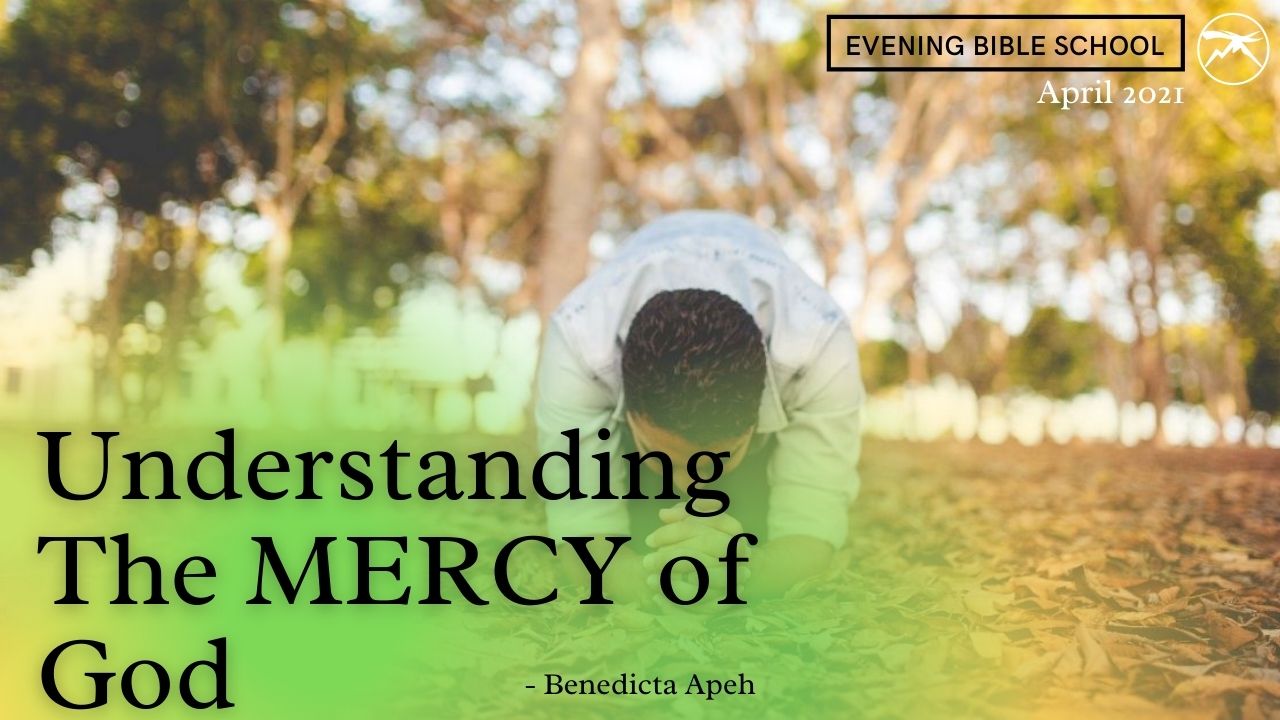My very first attempt at memorizing the beatitudes was about twenty years ago. I remember we were preparing for Junior Secondary School exams at the time and the beatitudes happened to be part of the syllabus under Christian Religious Knowledge (CRK). I remember vividly back then, our CRK teacher would give us some minutes to read the beatitudes in Matthew chapter five, and then he will call us to come in front of the class to come recite it without looking at the Bible. What I was reading back then didn’t so much make any spiritual sense to me, because I and many of my contemporaries at the time were just reading it to pass the examination. It was much more in the later years, after I had become grounded in the spiritual matters, that I began to see the spiritual angle to the beatitudes.
Jesus gave a compelling teaching in the book of Matthew chapter five which is popularly called the “The Beatitudes”, or “Sermon on the Mount” and I perceived in my spirit that there are a number of compelling truths embedded in those teachings which I believe the Holy Spirit would want to reveal to us tonight. Beatitude, according to the dictionary simply means “supreme blessedness.” It talks about the blessings of God in the highest form. I have come to realize that as simple as the blessings of God appear on the pages of the Scriptures, there are actually laid-down principles to assessing them.
Matthew 5:1-3, the Bible says:
“And seeing the multitudes, He went up on a mountain, and when He was seated His disciples came to Him. 2 Then He opened His mouth and taught them, saying:
3 “Blessed are the poor in spirit,
For theirs is the kingdom of heaven.”
If you read that verse 3 in the Amplified version, it says: “Blessed (happy, to be envied, and spiritually prosperous—with life-joy and satisfaction in God’s favour and salvation, regardless of their outward conditions) are the poor in spirit (the humble, who rate themselves insignificant), for theirs is the kingdom of heaven!” Now, reading verse three of the chapter raised a fundamental question that I have noted here, and the question is: what does it mean to be poor in spirit? Let us provide answer to this question.
To be poor in spirit in that context is not talking about you “having little money or few possessions, or not having enough money for the basic things that people need to live properly”, according to the dictionary. Noticed that the word “poor” as used in that verse by Jesus is not talking about lacking in physical possessions. To be “poor in spirit” is different from “to be poor physically.” A man may have all the riches and possessions of this world and still be poor in spirit towards God. In Luke 12:15, Jesus said: “Take heed and beware of covetousness, for one’s life does not consist in the abundance of the things he possesses.” The story of the rich fool that the Bible revealed to us is an example. The man’s barns were full, he was rich in the standards of the world however, his spirit was not rich towards God.
After he had boasted in himself, see what God said to him: “But God said to him, ‘Fool! This night your soul will be required of you; then whose will those things be which you have provided?’ 21 “So is he who lays up treasure for himself, and is not rich toward God.” (verse 20-21).
So, what does it mean to be poor in spirit? To be poor in spirit simply means to be broken before God and to be of a contrite heart! In Psalms 51:17, David wrote: “The Sacrifices of God are a broken spirit, A broken and a contrite heart – These, O God, you will not despise.” Now, this tells us that to be broken before God is a sacrifice. Even though you have all the wealth and the riches of the world, and you possess all the golds and diamonds and every treasures of the earth, what God is looking for is a broken man, a broken woman before Him. Why? Because there is no place for arrogancy before the presence of the Lord.
See what Proverbs 16:18-19(AMP) says:
Pride goes before destruction,
And a haughty spirit before a fall.
It is better to be humble in spirit with the lowly
Than to divide the spoil with the proud (haughty, arrogant)
God hates arrogancy with a passion! And a broken and a contrite heart the Lord does not despise. Prophet Isaiah also wrote as well in Isaiah 66:2b. It says: “but on this one will I look: On him who is poor and of a contrite spirit, and who trembles at my word.” A contrite heart is a heart that feels or shows regret for bad behavior. It is not the heart that does something wrong and does not show any feeling of remorse for it. When you get to a point where you are no longer broken before God or your heart is not sensitive again to the things that bring about correction, then something is fundamentally wrong.
2 Corinthians 7:10 tells us: “For godly sorrow produces repentance leading to salvation, not to be regretted; but the sorrow of the world produces death.” Despite the fact that Samuel was trying to tell king Saul that he has done something wrong, and that he has disobeyed God, Saul did not see any need to be broken. He still felt that what he did was for the purpose of sacrificing to God. And God was saying “I am not interested in that kind of sacrifices, but the kind of sacrifices that emanates from a broken spirit.”
Going to Matthew 5:4, it says:
Blessed are those who mourn,
For they shall be comforted.
Now, this also raises a fundamental question: Is God delighted that people remain in unhappiness and sadness because that is what it means to mourn. Now there are a number of things that I want to quickly point out to us here that this verse connotes. This verse first and foremost reveals to us one of the fundamental thing or area that the ministry of Jesus covers. Isaiah 61:1-3 shows us. It says:
“The Spirit of the Lord God is upon Me,
Because the Lord has anointed Me
To preach good tidings to the poor;
He has sent Me to heal the brokenhearted,
To proclaim liberty to the captives,
And the opening of the prison to those who are bound;
2 To proclaim the acceptable year of the Lord,
And the day of vengeance of our God;
To comfort all who mourn,
3 To console those who mourn in Zion,
To give them beauty for ashes,
The oil of joy for mourning,
The garment of praise for the spirit of heaviness;
That they may be called trees of righteousness,
The planting of the Lord, that He may be glorified.”
So, when Jesus said “blessed are those who mourn for they shall be comforted”, He was simply telling them that their days of mourning has come to an end because the message of the kingdom has come to stay.
Now, it also connotes to sorrowful and sad (mourn) for one’s own sins and inadequacies and shortcomings towards God. One thing that sin does is that it reveals man’s inadequacies before God and the moment sin is revealed, it is expected that one sincerely turns aside to God for true repentance and cleansing. Isaiah showed us what it means to mourn when one discovers his or her adequacies towards God. Isaiah 6:5 (TPT) says: “Then I stammered and said, “Woe is me! I’m destroyed—doomed as a sinful man! For my words are tainted and I live among people who talk the same way. King Yahweh, Commander of Angel Armies! My eyes have gazed upon him!”
Going to Matthew 5:5, it says:
Blessed are the meek,
For they shall inherit the earth.
The Bible said quite a number of things when it comes to meekness. Meekness is not synonymous with weakness. Meekness actually means possessing great amount of power but choosing to put it under control. Proverbs 16:32 says: “He who is slow to anger is better than the mighty, and he who rules his spirit than he who takes a city.” The Bible described Moses as one of the meekest man on earth in his time. It says “now the man Moses was very meek, above all the men which were upon the face of the earth.” Jesus was so powerful and yet meek at the same time. 2 Corinthians 10:1, apostle Paul wrote: “Now I, Paul, myself am pleading with you by the meekness and gentleness of Christ who in presence am lowly among you, but being absent am bold toward you.”
So, Jesus was saying in the beatitudes that it is only through meekness that a man, a woman can inherit the earth.
Going to Matthew 5:6, it says:
Blessed are those who hunger and thirst for righteousness,
For they shall be filled.
The first thing we will notice here is that Jesus didn’t say “blessed are those who hunger and thirst after material or physical” things. Now the reason is because material things of this world never satisfies. The more people get, the more people want to get. That is the reason you would see people steal and steal until they are caught in the act. Why? Because they are never satisfied. If you read Luke 6:25 (AMPC), it says: “Woe to (alas for) you who are full now (completely filled, luxuriously gorged and satiated), for you shall hunger and suffer want!” Did you see that? Material things don’t satisfy.
Proverbs 27:20 says: “Hell and destruction are never full; so, the eyes of man are never satisfied.” But In this verse, Jesus was giving us one of the prerequisites of receiving from God, which is through hunger and thirst for righteousness. There is that place of thirst if we are ever going to get anything from God. In Psalms 63:1, David wrote: “O God, you are my God; early will I seek you; my soul thirsts for you, my flesh longs for you in a dry and thirsty land, where there is no water.” Did we see that? Even though the man David needed to be filled desperately, his soul never stopped longing to God to be filled.
Jesus said in John 7:37: “If anyone thirsts, let him come to Me and drink.” The condition for drinking or partaking from His fulness is via thirst. No thirst, no hunger for God, the implication of that is you will remain the same. In 1 Corinthians 12:31, apostle Paul also said “but earnestly desire the best gift.” Nothing falls on you without the necessary hunger and thirst. The more you thirst after righteousness, the more you are filled, and you can never go wrong in this one.
Going to Matthew 5:7, it says:
7 Blessed are the merciful,
For they shall obtain mercy.
What does it mean to be merciful? Merriam-Webster defined the word “merciful” as “treating people with kindness and forgiveness, not cruel or harsh and having or showing mercy.” Now the striking thing that Jesus said in that verse is that if you are merciful, you would also obtain mercy. First, it reiterates the principle of “give and it shall be given unto you.” When you give mercy or when you show mercy, you are definitely going to reap mercy in return. If you don’t give mercy or show mercy, you would also not receive mercy in return. James 2:13 tells us: “For judgment is without mercy to the one who has shown no mercy. Mercy triumphs over judgment.” Did we see that?
Going to Matthew 5:8, it says:
8 Blessed are the pure in heart,
For they shall see God.
Some weeks ago, the Lord opened our eyes to certain truths about the subject of the heart when we examined: The ‘Heart’ of the Matter: Understanding Why God Is So Keen About the Heart. And so, I won’t dwell so much on this part. One of the things we can readily see from this beatitude is that God is concerned about the state of our heart, especially, the pureness of heart. In Matthew 23:25-26 Jesus said: “woe to you, Scribes and Pharisees, hypocrites! For you cleanse the outside of the cup and dish, but inside they are full of extortion and self-indulgence. Blind Pharisees, first cleanse the inside of the cup and dish, that the outside of them may be clean.” A man’s heart is opened before God like a book is opened before our eyes.
James 4:8 says: “Draw near to God and He will draw near to you. Cleanse your hands, you sinners and purify your hearts, you double-minded.” In order to be able to appear before God unhindered, it is important that we constantly purify our heart. David in Psalms 24 also wrote about this when he said: “who may ascend into the hill of the Lord? Or who may stand in His holy place? He who has clean hands and a pure heart, who has not lifted up his soul to an idol or sworn deceitfully.” A man, a woman may not successfully access the presence of the Lord without a pure heart, and this is why it is of utmost importance to ask the Lord always to purify our hearts, and our motives so that our sacrifices and offerings and services we render in His name would be acceptable in His presence.
Going to Matthew 5:9, it says:
9 Blessed are the peacemakers,
For they shall be called sons of God.
The first understanding we must take home from here is that peace, is an attribute of God. God has many attributes and peace is one of them. Apostle Paul wrote in Romans 15:33 that “now the God of peace be with you all. Amen.” God is the God of peace, and not “a god of peace.” Also, in 2 Corinthians 13:11, the same apostle Paul wrote to the Corinthian church this way: “finally, brethren, farewell. Become complete. Be of good comfort, be of one mind, live in peace; and the God of love and peace will be with you.” Did we see that? In Isaiah 9:6, Jesus was called the Prince of peace!
To be peacemakers simply means to go all out to bring about peace. The Bible says in Hebrews 12:14 to “Pursue peace with all people, and holiness, without which no one will see the Lord.” Romans 14:19 says “Therefore, let us pursue the things which male for peace and the things by which one may edify another.” From that place, we can see clearly that it is our duty to pursue the things that brings about peace.
Going to Matthew 5:10-11, it says:
10 Blessed are those who are persecuted for righteousness’ sake,
For theirs is the kingdom of heaven. 11 Blessed are you when they revile and persecute you, and say all kinds of evil against you falsely for My sake.
There is no blessedness in being persecuted for a wrong cause. As a matter of fact, whatever a man sows, whether in righteousness or unrighteousness, the same shall the person reap. But there is blessedness in being persecuted for the sake of righteousness. Apostle Paul wrote in 2 Timothy 3:12, it says: “In fact, everyone who wants to live a godly life in Christ Jesus will be persecuted.” The only time you won’t be persecuted is if only you are standing on the part of the world. In Acts 14:22, the Bible says: “And when they had preached the gospel to that city and made many disciples, they returned to Lystra, Iconium, and Antioch, 22 strengthening the souls of the disciples, exhorting them to continue in the faith, and saying, “We must through many tribulations enter the kingdom of God.” But in all of these persecutions, Jesus said “Blessed are you.”
I believe you have been blessed!
Thanks for the gift of your time, Obayomi Abiola Benjamin!
Feel free to share your thoughts or testimony in the comment box below. I promise to respond as soon as possible!














































What Do You Think About This Article? Share Your Comment
Please login to post a comment!